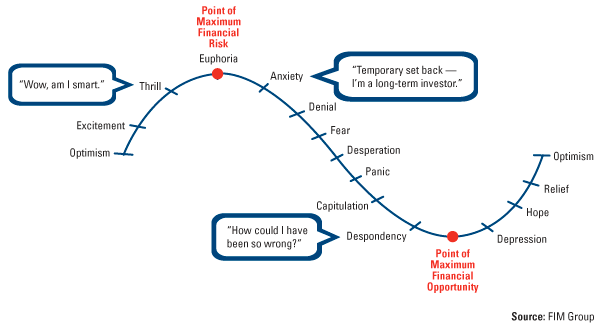How Emotions Can Hurt Your Investment Portfolio
You need a logical investment strategy to help manage how you're bound to react to the ups and downs of the market.

Profit and prosper with the best of Kiplinger's advice on investing, taxes, retirement, personal finance and much more. Delivered daily. Enter your email in the box and click Sign Me Up.
You are now subscribed
Your newsletter sign-up was successful
Want to add more newsletters?

Delivered daily
Kiplinger Today
Profit and prosper with the best of Kiplinger's advice on investing, taxes, retirement, personal finance and much more delivered daily. Smart money moves start here.

Sent five days a week
Kiplinger A Step Ahead
Get practical help to make better financial decisions in your everyday life, from spending to savings on top deals.

Delivered daily
Kiplinger Closing Bell
Get today's biggest financial and investing headlines delivered to your inbox every day the U.S. stock market is open.

Sent twice a week
Kiplinger Adviser Intel
Financial pros across the country share best practices and fresh tactics to preserve and grow your wealth.

Delivered weekly
Kiplinger Tax Tips
Trim your federal and state tax bills with practical tax-planning and tax-cutting strategies.

Sent twice a week
Kiplinger Retirement Tips
Your twice-a-week guide to planning and enjoying a financially secure and richly rewarding retirement

Sent bimonthly.
Kiplinger Adviser Angle
Insights for advisers, wealth managers and other financial professionals.

Sent twice a week
Kiplinger Investing Weekly
Your twice-a-week roundup of promising stocks, funds, companies and industries you should consider, ones you should avoid, and why.

Sent weekly for six weeks
Kiplinger Invest for Retirement
Your step-by-step six-part series on how to invest for retirement, from devising a successful strategy to exactly which investments to choose.
"I love it!"
"I hate it!"
Both are emotional comments about almost anything, and they certainly carry over when it comes to investing. After all, we're only human.
From just $107.88 $24.99 for Kiplinger Personal Finance
Become a smarter, better informed investor. Subscribe from just $107.88 $24.99, plus get up to 4 Special Issues

Sign up for Kiplinger’s Free Newsletters
Profit and prosper with the best of expert advice on investing, taxes, retirement, personal finance and more - straight to your e-mail.
Profit and prosper with the best of expert advice - straight to your e-mail.
Why might this be a good time to have a discussion about this topic? The first two months of 2016 have been interesting, to say the least when it comes to investing. And 2015 wasn't so great. So, how should you deal with this current uncertainty? Before we arrive at an answer to this, it would be helpful to look at how we humans emotionally react to the up and down movements of the investment markets. As a believer that a picture is worth a thousand words, I offer the picture below for us to examine:

As the markets move up, even though it's never in a straight line, we go from optimism to euphoria, where the maximum potential risk level is reached. We now truly believe we are geniuses! What could possibly go wrong when we're so smart?
As the markets move down, as they all do at some point, our emotional state changes and we try to justify why we couldn't possibly be wrong. And as the slide continues, our emotions get stronger and stronger with fear kicking in more and more. And more often than not, we're more concerned about being wrong than the value we might be losing. How could we suddenly have gone from being so smart to being so dumb?
Invariably at the bottom of the market, our emotions have become so overwhelming that we convince ourselves that we really don't know anything, and now it's time to get out. Or we might think this whole investment process is rigged against us since it couldn't be possibly our faults. This happens at precisely the most opportune time to be in the market.
But before we can muster the emotional fortitude to jump back in, our depression needs to wane and hope, relief, and optimism need to take over again so we can decide to invest now.
Understanding how this cycle repeats itself could make you a better investor, but there are no guarantees of that. You also need to learn to not let emotions have much of any part of the investing process. How can you accomplish this?
You need a plan. A logical plan based on fact, not emotion. You need to think like Mr. Spock in Star Trek.
I'm not an advocate of simply buying the whole market and holding on forever. Yes, over a long time the markets inevitably go up, but your timeline may not be that long. I have never bought any investment for a client that we expected to hold forever. Nothing works forever.
There have been multitudes of successful investors over the years that have lived by the mandate that you have to be willing to buy when everyone else is selling and sell when everyone else is buying. If this feels emotionally difficult to do, that is exactly why we need a logical plan of what to buy, when to buy it, when to sell it, how much of it to buy and what are the key factors to go into determining all of these things. (This is a subject intended for a future article, so stay tuned.)
Hopefully, this discussion helps to explain why we, as humans, react the way we do, and how that natural reaction can be a negative when it comes to investing. It's negative in the sense that we may be buying high and selling low because our emotions tell us to do it that way, but also negative in the overall emotional turmoil it can cause.
Do yourself a favor. Understand what's going on in your heart and your head and have a plan to let logic rule the day, especially when it comes to investing.
Charles C. Scott, Accredited Investment Fiduciary®, has more than 30 years of experience in the financial services industry. "Our mission is to help our clients discover, design and live the life that they want to live by matching their finances with their visions, values and goals."
Profit and prosper with the best of Kiplinger's advice on investing, taxes, retirement, personal finance and much more. Delivered daily. Enter your email in the box and click Sign Me Up.

Charles C. Scott, Accredited Investment Fiduciary®, has more than 30 years of experience in the financial services industry. He developed and managed an institutional sales department for Washington Mutual, and then served as the Northwest Regional Manager for MFS, America's oldest mutual fund company. Since 1993, he has been an independent adviser, focusing on providing his clients with objective, unbiased planning and investment advice. He has written for the Wall Street Journal, CFO Magazine and other publications.
-
 Nasdaq Leads a Rocky Risk-On Rally: Stock Market Today
Nasdaq Leads a Rocky Risk-On Rally: Stock Market TodayAnother worrying bout of late-session weakness couldn't take down the main equity indexes on Wednesday.
-
 Quiz: Do You Know How to Avoid the "Medigap Trap?"
Quiz: Do You Know How to Avoid the "Medigap Trap?"Quiz Test your basic knowledge of the "Medigap Trap" in our quick quiz.
-
 5 Top Tax-Efficient Mutual Funds for Smarter Investing
5 Top Tax-Efficient Mutual Funds for Smarter InvestingMutual funds are many things, but "tax-friendly" usually isn't one of them. These are the exceptions.
-
 Social Security Break-Even Math Is Helpful, But Don't Let It Dictate When You'll File
Social Security Break-Even Math Is Helpful, But Don't Let It Dictate When You'll FileYour Social Security break-even age tells you how long you'd need to live for delaying to pay off, but shouldn't be the sole basis for deciding when to claim.
-
 I'm an Opportunity Zone Pro: This Is How to Deliver Roth-Like Tax-Free Growth (Without Contribution Limits)
I'm an Opportunity Zone Pro: This Is How to Deliver Roth-Like Tax-Free Growth (Without Contribution Limits)Investors who combine Roth IRAs, the gold standard of tax-free savings, with qualified opportunity funds could enjoy decades of tax-free growth.
-
 One of the Most Powerful Wealth-Building Moves a Woman Can Make: A Midcareer Pivot
One of the Most Powerful Wealth-Building Moves a Woman Can Make: A Midcareer PivotIf it feels like you can't sustain what you're doing for the next 20 years, it's time for an honest look at what's draining you and what energizes you.
-
 I'm a Wealth Adviser Obsessed With Mahjong: Here Are 8 Ways It Can Teach Us How to Manage Our Money
I'm a Wealth Adviser Obsessed With Mahjong: Here Are 8 Ways It Can Teach Us How to Manage Our MoneyThis increasingly popular Chinese game can teach us not only how to help manage our money but also how important it is to connect with other people.
-
 Looking for a Financial Book That Won't Put Your Young Adult to Sleep? This One Makes 'Cents'
Looking for a Financial Book That Won't Put Your Young Adult to Sleep? This One Makes 'Cents'"Wealth Your Way" by Cosmo DeStefano offers a highly accessible guide for young adults and their parents on building wealth through simple, consistent habits.
-
 Global Uncertainty Has Investors Running Scared: This Is How Advisers Can Reassure Them
Global Uncertainty Has Investors Running Scared: This Is How Advisers Can Reassure ThemHow can advisers reassure clients nervous about their plans in an increasingly complex and rapidly changing world? This conversational framework provides the key.
-
 I'm a Real Estate Investing Pro: This Is How to Use 1031 Exchanges to Scale Up Your Real Estate Empire
I'm a Real Estate Investing Pro: This Is How to Use 1031 Exchanges to Scale Up Your Real Estate EmpireSmall rental properties can be excellent investments, but you can use 1031 exchanges to transition to commercial real estate for bigger wealth-building.
-
 Should You Jump on the Roth Conversion Bandwagon? A Financial Adviser Weighs In
Should You Jump on the Roth Conversion Bandwagon? A Financial Adviser Weighs InRoth conversions are all the rage, but what works well for one household can cause financial strain for another. This is what you should consider before moving ahead.